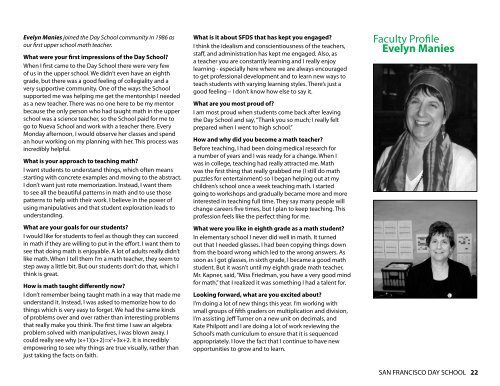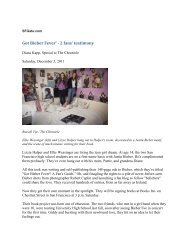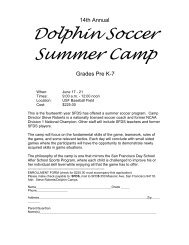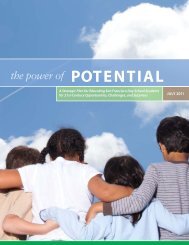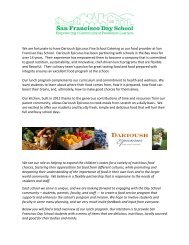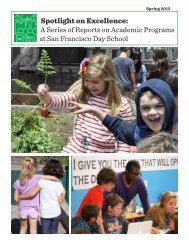2007-2008 SFDS Annual Report - San Francisco Day School
2007-2008 SFDS Annual Report - San Francisco Day School
2007-2008 SFDS Annual Report - San Francisco Day School
Create successful ePaper yourself
Turn your PDF publications into a flip-book with our unique Google optimized e-Paper software.
Evelyn Manies joined the <strong>Day</strong> <strong>School</strong> community in 1986 as<br />
our first upper school math teacher.<br />
What were your first impressions of the <strong>Day</strong> <strong>School</strong>?<br />
When I first came to the <strong>Day</strong> <strong>School</strong> there were very few<br />
of us in the upper school. We didn’t even have an eighth<br />
grade, but there was a good feeling of collegiality and a<br />
very supportive community. One of the ways the <strong>School</strong><br />
supported me was helping me get the mentorship I needed<br />
as a new teacher. There was no one here to be my mentor<br />
because the only person who had taught math in the upper<br />
school was a science teacher, so the <strong>School</strong> paid for me to<br />
go to Nueva <strong>School</strong> and work with a teacher there. Every<br />
Monday afternoon, I would observe her classes and spend<br />
an hour working on my planning with her. This process was<br />
incredibly helpful.<br />
What is your approach to teaching math?<br />
I want students to understand things, which often means<br />
starting with concrete examples and moving to the abstract.<br />
I don’t want just rote memorization. Instead, I want them<br />
to see all the beautiful patterns in math and to use those<br />
patterns to help with their work. I believe in the power of<br />
using manipulatives and that student exploration leads to<br />
understanding.<br />
What are your goals for our students?<br />
I would like for students to feel as though they can succeed<br />
in math if they are willing to put in the effort. I want them to<br />
see that doing math is enjoyable. A lot of adults really didn’t<br />
like math. When I tell them I’m a math teacher, they seem to<br />
step away a little bit. But our students don’t do that, which I<br />
think is great.<br />
How is math taught differently now?<br />
I don’t remember being taught math in a way that made me<br />
understand it. Instead, I was asked to memorize how to do<br />
things which is very easy to forget. We had the same kinds<br />
of problems over and over rather than interesting problems<br />
that really make you think. The first time I saw an algebra<br />
problem solved with manipulatives, I was blown away. I<br />
could really see why (x+1)(x+2)=x 2 +3x+2. It is incredibly<br />
empowering to see why things are true visually, rather than<br />
just taking the facts on faith.<br />
What is it about <strong>SFDS</strong> that has kept you engaged?<br />
I think the idealism and conscientiousness of the teachers,<br />
staff, and administration has kept me engaged. Also, as<br />
a teacher you are constantly learning and I really enjoy<br />
learning - especially here where we are always encouraged<br />
to get professional development and to learn new ways to<br />
teach students with varying learning styles. There’s just a<br />
good feeling – I don’t know how else to say it.<br />
What are you most proud of?<br />
I am most proud when students come back after leaving<br />
the <strong>Day</strong> <strong>School</strong> and say, “Thank you so much; I really felt<br />
prepared when I went to high school.”<br />
How and why did you become a math teacher?<br />
Before teaching, I had been doing medical research for<br />
a number of years and I was ready for a change. When I<br />
was in college, teaching had really attracted me. Math<br />
was the first thing that really grabbed me (I still do math<br />
puzzles for entertainment) so I began helping out at my<br />
children’s school once a week teaching math. I started<br />
going to workshops and gradually became more and more<br />
interested in teaching full time. They say many people will<br />
change careers five times, but I plan to keep teaching. This<br />
profession feels like the perfect thing for me.<br />
What were you like in eighth grade as a math student?<br />
In elementary school I never did well in math. It turned<br />
out that I needed glasses. I had been copying things down<br />
from the board wrong which led to the wrong answers. As<br />
soon as I got glasses, in sixth grade, I became a good math<br />
student. But it wasn’t until my eighth grade math teacher,<br />
Mr. Kapner, said, “Miss Friedman, you have a very good mind<br />
for math,” that I realized it was something I had a talent for.<br />
Looking forward, what are you excited about?<br />
I’m doing a lot of new things this year. I’m working with<br />
small groups of fifth graders on multiplication and division,<br />
I’m assisting Jeff Turner on a new unit on decimals, and<br />
Kate Philpott and I are doing a lot of work reviewing the<br />
<strong>School</strong>’s math curriculum to ensure that it is sequenced<br />
appropriately. I love the fact that I continue to have new<br />
opportunities to grow and to learn.<br />
Faculty Profile<br />
Evelyn Manies<br />
SAN FRANCISCO DAY SCHOOL 22


